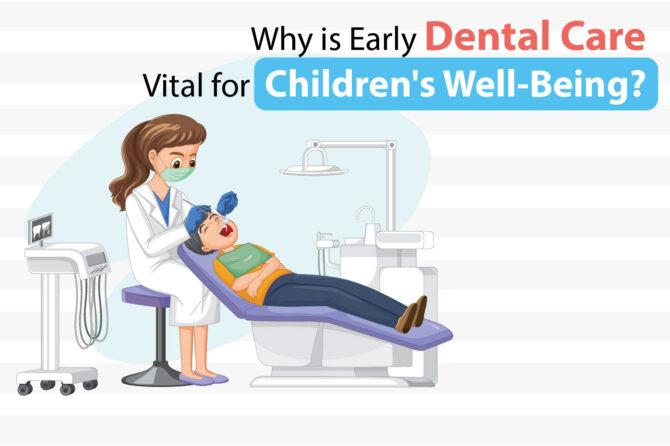
Why is Early Dental Care Vital for Children’s Well-Being?
Good oral health is fundamental to overall well-being, and establishing healthy dental habits from a young age is crucial. Early dental care for children sets the foundation for a lifetime of strong teeth and gums, preventing dental issues and contributing to their overall health. In this article, we’ll explore the importance of early dental care, what it entails, and how parents and caregivers can promote optimal oral health for their children.
Prevention of Dental Issues
One of the primary reasons for early dental care is prevention. Dental problems, such as cavities and gum disease, are largely preventable with proper oral hygiene and regular dental check-ups. Starting early with oral care routines can significantly reduce the risk of these issues.
Tooth Decay: Tooth decay is one of the most common childhood diseases. Early dental care emphasizes proper brushing and flossing techniques, as well as regular dental visits, to prevent toothaches and cavities.
Gum Disease: Gum disease can lead to tooth loss and impact overall health. Teaching children to brush their gums gently and establishing regular dental check-ups can prevent gum issues.
Healthy Habits for Life
Early dental care instills essential oral hygiene habits that can last a lifetime. Children who learn to brush, floss, and care for their teeth from a young age are more likely to continue these practices into adulthood. These habits not only promote good oral health but also contribute to better overall health.
Proper Brushing and Flossing: Children should be taught the correct way to brush and floss their teeth, ensuring thorough cleaning and plaque removal.
Healthy Diet: Early dental care often includes guidance on a balanced diet, limiting sugary snacks and drinks that can contribute to cavities.
Regular Dental Check-Ups: Encouraging regular dental visits establishes a routine of preventive care, making it more likely that children will continue to seek dental care as they grow.
Speech Development and Confidence
Oral health is closely tied to speech development. Children with dental issues like misaligned teeth or speech impediments related to oral problems may face challenges in communication and self-confidence. Early dental care can address these issues promptly.
Speech: Dental problems like missing or misaligned teeth can impact speech development. Early intervention and orthodontic treatment, if needed, can improve speech clarity.
Self-Confidence: Children with healthy teeth are more likely to smile confidently and engage socially without the self-consciousness that dental issues can cause.
Preventing Pain and Discomfort
Dental problems can be painful and distressing for children. Toothaches, gum infections, and other dental issues can disrupt their daily lives and even affect their ability to eat and sleep. Early dental care aims to prevent these painful experiences.
Pain Prevention: Early detection and treatment of dental problems can prevent pain and discomfort, ensuring that children can enjoy their daily activities without dental-related interruptions.
Quality of Life: Good oral health contributes to a higher quality of life, as children can eat, sleep, and engage in activities without the hindrance of dental pain.
Proper Dental Development
Early dental care also focuses on monitoring the proper development of teeth and jaws. Detecting and addressing developmental issues early can prevent more extensive problems in the future.
Orthodontic Issues: Misaligned teeth or jaw problems can be corrected more easily when identified in childhood. Early orthodontic intervention can prevent the need for more extensive treatments later on.
Space Maintenance: Losing baby teeth prematurely can affect the spacing and alignment of permanent teeth. Early dental care can address issues like space maintenance to ensure proper alignment.
Building a Positive Relationship with the Dentist
Children who start visiting the dentist early tend to develop positive associations with dental care. A welcoming and child-friendly dental office environment can make dental visits a positive experience.
Reduced Dental Anxiety: Regular visits to the dentist from a young age can reduce dental anxiety, making it more likely that children will continue to seek dental care throughout their lives.
Open Communication: Establishing a relationship with a pediatric dentist allows for open communication about any concerns or issues related to oral health.
Conclusion
Early dental care plays a pivotal role in children’s well-being by preventing dental issues, promoting healthy habits, and ensuring proper dental development. Parents and caregivers should prioritize oral health from a young age, starting with regular dental check-ups and teaching proper oral hygiene routines. By doing so, they can set the stage for a lifetime of healthy teeth and gums, contributing to their children’s overall health and happiness. In the fight against dental problems, Kids Dental Studio stands as a strong ally. It’s a place where healthy smiles are nurtured, and early dental care is a tradition that benefits generations to come.
Leave a reply